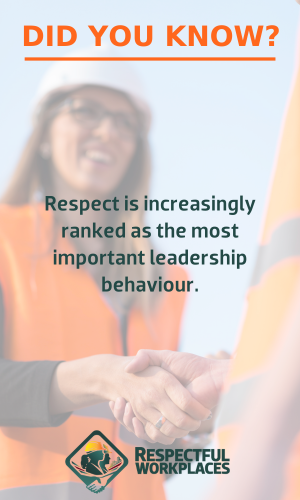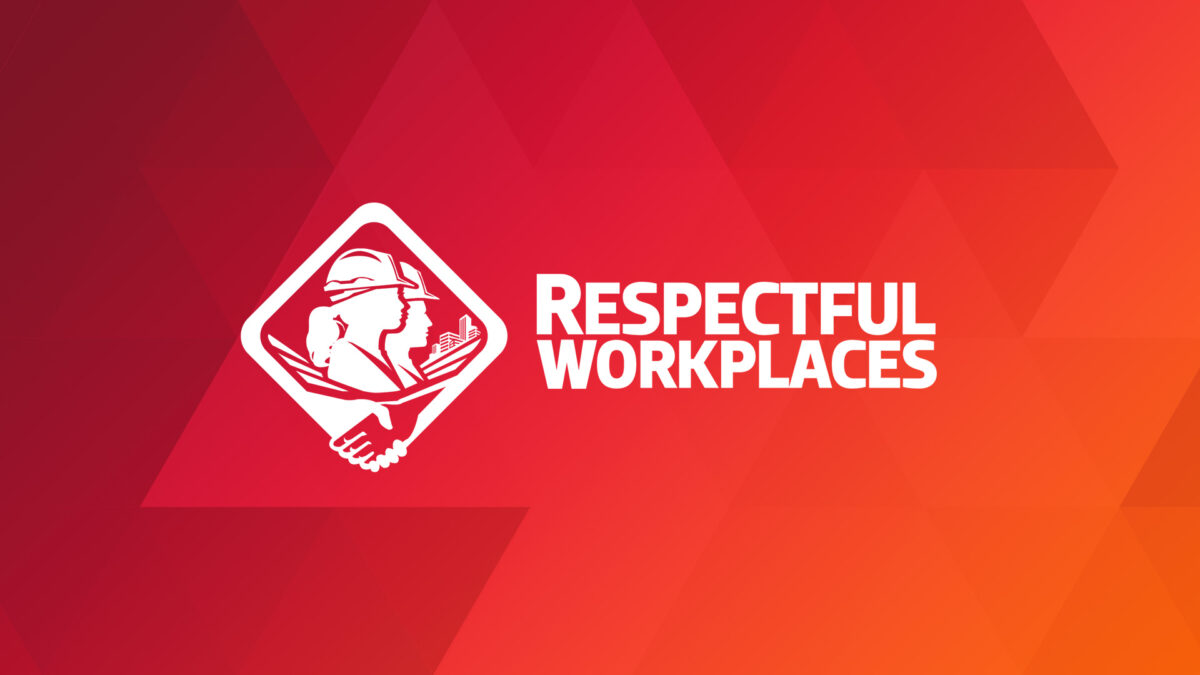Key Actions to Building a Respectful and Inclusive Workplace

Promoting a respectful and inclusive workplace is crucial for the Canadian construction industry.
With a need of just under 300,000 workers over the next decade, construction must address the barriers faced by marginalized groups and actively foster inclusivity as a tool to broaden and deepen its talent pool.
Embracing equity, diversity, and inclusivity (EDI) must be driven by management. It’s no different than safety, and in many ways, equally important to the future of the construction sector. EDI helps support industry recruitment efforts when marketing careers to young Canadians, women, Indigenous People, and newcomers. Much like safety, EDI must be embedded in a company’s culture. Senior managers need to not only stress the importance of EDI, but also hold managers throughout the company responsible for its implementation.
In this blog post, we will delve into the significance of dismantling barriers to inclusivity, fostering equality, and creating a workplace culture that embraces diversity.
Recognizing barriers to inclusion
To build a respectful workplace, it is essential to recognize and acknowledge the barriers faced by marginalized groups.
Research shows that organizations around the world recognize the need to create respectful and inclusive workplaces in which many people as possible contribute, collaborate, and ultimately thrive.
However, success can be elusive. In a study of 2,000 employees, nearly three quarters were aware that their organization had established one or more inclusion initiatives, yet only one-third of the intended beneficiaries said that they had personally gained from them.
Despite policies and programs to create welcoming and inclusive workplaces for Indigenous people and members of LGBTQ2S+ communities, workers from these groups are not experiencing the intended benefits. They continue to experience higher levels of unfair treatment, isolation, and subtle forms of exclusion such as bias and stereotyping than the majority of workers.
One of the reasons why members of traditionally under-represented groups are not benefitting from inclusion efforts is that organizations tend to develop policies and programs based on broad categories, such as “anti-discrimination” or “racism”.
However, barriers often take different forms for different demographic groups. For example, racism is experienced differently for a man than a woman; discrimination on the job as experienced by an Indigenous person is different from how it is experienced by an LGBTQ2S+ person.
And within these groups, individuals vary in their multiplicity of identities. These diversities also require distinct approaches to inclusion.
Learn more about barriers to inclusion and intersectionality.
Building a culture of respect and inclusivity
Respect is increasingly seen as a key component of leadership behaviour. In the social-media, instant-messaging, and rapid-fire email age, it’s all too easy for people to act without considering the consequences of a hastily worded message.
A recent study performed by researchers at Georgetown University found that respondents ranked respect as the most important leadership behaviour. Yet, they also reported that the number of incidents of disrespect are rising steadily each year. These include publicly mocking and belittling people, ignoring people, and teasing in ways that sting.
This has consequences for workplaces. Research shows that 80% of workers who are treated disrespectfully spend significant work time ruminating on the bad behaviour, and 48% deliberately reduce their effort.
Furthermore, while all workers can experience disrespect, members of traditionally under-represented groups, such as women, and members of LGBTQ2S+, Black, Indigenous, and People of Colour communities tend to experience greater incidents of violations of respect than the general population because of their demographic characteristics.
Without specific measures to address the experience of members of these groups, not only will the workplace not be respectful of all workers, but employers may struggle with worker morale, productivity, and retention issues if corrective actions are not taken.
To reverse the trend of disrespectful and uncivil behaviour, leaders must develop a compelling and comprehensive vision of a respectful and inclusive workplace culture. And because workplace culture is the result of many factors, transforming it requires a robust approach.
Learn more about building a workplace culture that promotes respect.
Question beliefs, opinions, and practices
Most leaders and managers want the diversity that members of traditionally under-represented groups bring to a workplace. Fifty-seven percent of workers want to see more diversity in their workplace, and almost 70% of executives consider diversity to be a critical factor in their organization’s success.
Despite this, bias and stereotypes continue to negatively influence the careers of women, Black, Indigenous, and People of Colour. For example, in a study of tradeswomen’s experiences at work, 64% of managers said that women face discrimination related to gender bias. The BlackNorth Initiative reports that 60% of Black employees have been discriminated against because of stereotypes related to their intellectual ability. And Catalyst found that 52% of Indigenous People in Canada regularly experience bias.
According to Adam Grant, an organizational psychologist at the Wharton School of the University of Pennsylvania, bias and stereotypes persist because of our inability to “rethink” our deeply held beliefs and outdated opinions. He has found that rethinking our opinions is a very difficult task. Research shows that we don’t just hesitate to rethink our opinions: we hesitate at the very idea of rethinking them. And often, the more successful we are, the more trouble we have.
His research has shown that we are quick to recognize when other people need to rethink their beliefs and opinions or “think again.” For example, we question the judgement of experts whenever we seek out a second opinion on a medical diagnosis. Unfortunately, when it comes to our own knowledge and opinions, we often favour “feeling” right over “being” right.
He has found that bias and stereotypes are particularly difficult to rethink. Even if we don’t consciously believe these biases and stereotypes, they are continually reinforced in ways that make it difficult to effectively change them.
Most people find it difficult to recognize or accept the fact that they even have biases. This is the “bias blind spot”: the belief that we are more objective than others. However, because of the influence that leaders have throughout an organization, they have a responsibility to recognize not only that they have biases, but they are more likely than others to fall into the bias blind spot trap.
According to Grant, it is critical that we become aware of the beliefs and outdated opinions that are influencing our decision making. Without this awareness leaders and their organizations will not be positioned for success and the changes that the future demands.
Learn about how beliefs and outdated opinions influence decision making.
Regular evaluation and progress monitoring is key
Building a respectful workplace requires is an ongoing process that requires regular evaluation and constant monitoring.
By recognizing barriers, fostering a supportive culture, empowering marginalized employees, and questioning long-held practices and ideas, companies can embrace diversity, drive innovation, and set a benchmark for inclusivity.
Our Respectful Workplace Policy Framework and Implementation Guide can help.
Read from the beginning. Click here to start at Part 1.
What can an effective Respectful and Inclusive Workplace Program deliver?
- Become an employer of choice – attract, retain, and advance top talent from all sources of labour
- Unlock collaboration and innovation – create high-performing teams through diversity of thought and experience
- Build your brand – your organization will gain a competitive edge as a leader and innovator
Get started today!
The BuildForce Canada Online Respectful and Inclusive Workplace Toolkit includes:
- the Respectful Workplace Online Self-Assessment Tool to assist organization leadership in assessing their current situation and identifying where they may need to make changes
- the Respectful Workplace Policy Framework and Implementation Guide to assist organizations in creating and implementing a policy that supports a respectful and inclusive workplace
- the Respectful Workplace Online Training Course to train workers on how to create and support a respectful and inclusive workplace
- the online course Introduction to Understanding Systemic Racism: A Guide for Leaders and Managers
All the resources you need to create and support a respectful and inclusive workplace!

Respectful and Inclusive Workplaces
